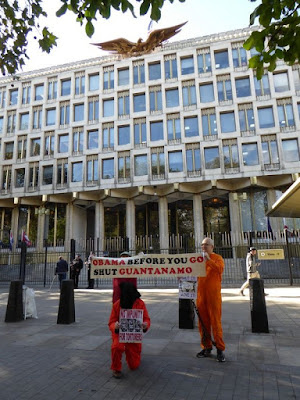Guantánamo Bay
Pre-trial hearings took place in two cases over the past month: in early April, in the USS Cole case in which Yemeni prisoner Abd Al-Nashiri is accused of involvement in an attack that led to the death of 17 sailors off Yemen in 2000, the first hearing took place in the case since June last year with a new judge, who is understood to want to start the trial in the case in 2025. A five-week hearing is also currently underway in the case of four men accused of involvement in the September 2001 attacks in New York City. The hearing was paused for the Muslim holy month of Ramadan. Hearings continued where they left off previously, hearing prosecution witnesses from the FBI and other bodies, with some sessions held behind closed doors. On 26 April, “In an apparent historic first, the military judge presiding over the Sept. 11 military commission on Friday left his highly secure courtroom here to travel five miles to the former black site on Guantanamo Bay where the CIA secretly interrogated detainees between 2003-2004 and the FBI later attempted to get "clean" statements for use in a criminal case.
“The location – Camp Echo 2 – was commandeered following the black site detentions in an effort to sanitize coerced statements extracted on this same ground, or at black sites that defense attorneys say were eerily similar. The government claims the subsequent statements, given in January 2007 to the FBI, constitute clean recountings made without coercion and should be admissible at trial. Roughly four months before the statements the Bush administration had announced the transfer of the accused and other high-value detainees to Guantanamo Bay from CIA custody.
“The groundbreaking visit was led by the fourth judge to preside over pretrial hearings, Air Force Col. Matthew McCall. Earlier this week, he explained in an order that a “a site visit” to Echo 2 “would be beneficial for determining” whether he should suppress the contested statements to the FBI. The defense teams claim any disclosures to the FBI resulted from the CIA's prior torture and relentless conditioning of their clients. The prosecution claims the defendants gave their 2007 statements voluntarily.
“The site visit was “historic” as “the first time a judicial officer has visited a former CIA black site,” said James Connell, the lead lawyer for defendant Ammar al Baluchi. Echo 2 is a fulcrum on which the judge will decide if the 2007 statements given to the FBI were sufficiently attenuated from the preceding years of incommunicado detention by the CIA.””
A new $US4 million second courtroom has also opened to allow two consecutive hearings to take place, although attendants of one were not allowed to switch over to the other in different sessions.
Extraordinary rendition
Lithuania has decided not to appeal a European Court of Human Rights ruling finding it complicit in the CIA’s extraordinary rendition programme with respect to current Guantánamo prisoner, Saudi Mustafa al-Hawsawi. The ruling thus became final on 16 April. “In late January, the ECtHR awarded 100,000 euros to Mustafa al-Hawsawi for his unlawful detention in the alleged secret facility, and another 30,000 euros to REDRESS, the non-governmental organisation that represented the Saudi national. The Strasbourg court found that al-Hawsawi’s detention in Lithuania had violated various articles of the European Convention on Human Rights, such as the prohibition of torture, the right to a fair trial, the right to life, liberty, and security.”
Twenty years after US prisoner torture and abuse at the Iraqi Abu Ghraib prison was revealed, three former prisoners have had their day in a US court, in a long-running case against US military contractor CACI, Al-Shimari v. CACI. The victims were able to make statements and share their experiences, including post-release trauma and illness, with CACI claiming that the victims were not in the infamous torture pictures and cannot prove they were tortured by its staff, and that ultimately the US military is responsible, to wash its hands of liability. Two weeks after the hearing, the jury has still not delivered its verdict in the case.
https://apnews.com/article/abu-ghraib-trial-iraq-virginia-9e6eae5c7ea05fac90d8541efdd15562






